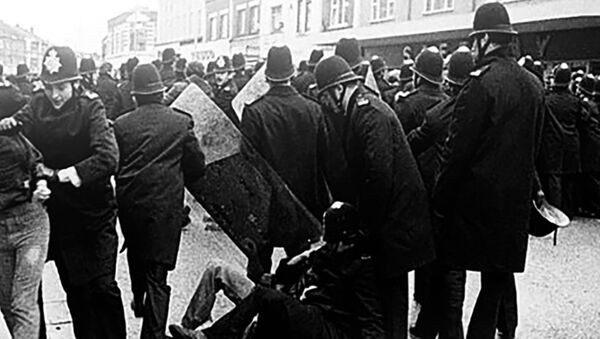New Zealand-born teacher Blair Peach died after being struck on the head by a policeman's baton during the protests outside Southall Town Hall in west London.
Although 700 people were arrested that day and 345 were charged with various offences, nobody has ever been convicted of killing Peach, 33.
An investigation by Commander John Cass of the Metropolitan Police's internal complaints department suggested the fatal blow was delivered by one of six officers from Scotland Yard's notorious Special Patrol Group (SPG), which was eventually disbanded in 1987.
A moving picture of Blair Peach teaching, shared on the #Southallresists40 WhatsApp group. What a find. Please come and join us on 23rd and 27th April in memory of Gurdip Singh Chaggar and Blair Peach pic.twitter.com/pRVOE8Oapf
— SouthallResists40 (@Southall40) 18 April 2019
Suresh Grover, a long-time race relations campaigner and chair of the Southall Monitoring Group, was there on 23 April 1979 and is playing a prominent role in organising a march to commemorate the events and combat racism.
"His murder is still unsolved and it is unfinished business. We need the police to acknowledge it, even if someone was not convicted. We need either a new inquest or a public inquiry," Mr Grover told Sputnik.
He said dozens of people were injured by the police that day, including Clarence Baker, the manager of reggae group Misty In Roots, who spent three months in intensive care and "nearly died".
1976- Southall youth take to the streets following the racist murder of 18 year old Gurdip Singh Chaggar #southallresists40 pic.twitter.com/g3h7M5J2h4
— SouthallResists40 (@Southall40) 12 April 2019
Mr Grover said the SPG were using lead-filled coshes and someone even had National Front stickers on their vans.
In 1979 Amin Mawani, now 71, was a carpenter living in west London.
"I had joined the Anti Nazi League in the mid-70s and we used to hand out leaflets at football grounds because the National Front would do the same. Two or three clubs, like Millwall, were identified with the National Front and you felt those were no-go areas," Mr Mawani told Sputnik.
On 23 April 1979, which was a Monday, he headed to Southall after work in the hope of joining the protest against the National Front meeting.
He talked his way past a police cordon but said he could not get near the town hall because of the massed ranks of the police.
"Tensions got out of control. The police were driving a corridor for the National Front to get to the town hall. There were only four members of the public at the meeting and only a dozen National Front people there. The demonstrators started pushing but it started to get out of control and cascaded down the road," Mr Mawani told Sputnik.
Murder of anti-far right activist Blair Peach #onthisday 1979 by the police at a demonstration against the National Front #britainfirst #edl pic.twitter.com/VmsJQPl86z
— Working Class History (@wrkclasshistory) 23 April 2017
"The National Front were a bit like the English Defence League but they're more Islamophobic. The National Front were inspired by the rhetoric of Enoch Powell and they supported repatriation of immigrants. They believed Britain was becoming a ‘mongrel society'," Mr Mawani told Sputnik.
During the 1960s and early 70s thousands of immigrants from India and Pakistan had come to Southall, often to do poorly paid or dirty jobs that British workers rejected. But they faced racism from local white youths, who often daubed the National Front's logo on graffiti and hurled racial epithets at Asian immigrants.
In June 1976 Gurdip Singh Chaggar, an 18-year-old Sikh student, was stabbed to death outside the Dominion cinema in Southall. His murder has never been solved.
The Asian community was furious and when, in the spring of 1979, the Conservative-controlled Ealing Council gave permission for the National Front to hold a public meeting at Southall Town Hall they rose up and decided enough was enough.
There were mass community protests and the Southall Youth Movement was formed. Then came the killing of young teacher Blair Peach, struck on the head by police from the Met's Special Patrol Group while protesting against the National Front in April 1979- 40 years ago. pic.twitter.com/YoZDCTMMqb
— Dr Louise Raw (@LouiseRawAuthor) 13 April 2019
The Labour government, which would be defeated in a landslide election in May 1979, refused to overrule the council and the Prime Minister, Jim Callaghan, described the protesters as "extremists".
Mr Grover said there were echoes of 1979 in 2019.




